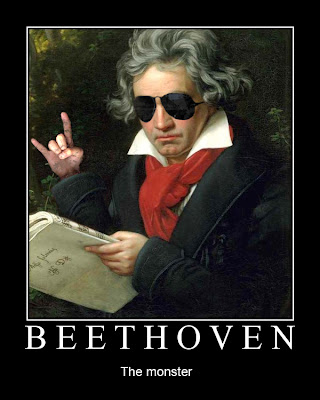I don’t mean to invoke Barthes facetiously, but I can’t help but notice that Mozart, Beethoven, Brahms, Bach, Handel, Haydn, Verdi, Puccini, Chopin, Tchaikovsky, and Debussy are dying. Perhaps Tchaikovsky will be mummified temporarily in the sequined swaths of Black Swan, but he would be doing no better than the notoriously frozen Walt Disney. Having attended several of the Met simulcasts and their encores, I felt remarkably out of place, again, a bit like Johnny or Barbara in the cemetery. Young people, on the whole, have little interest in opera or classical music in general. To invoke the largely irritating Harold Bloom, I wonder if this is the “anxiety of influence”: a simple case of young people rejecting the music lauded by the generation that came before them. Many opera companies and orchestras offer special rates to students or people under thirty to attend their productions; this is not only for all of the sentimental ideas about passing the music on to the next generation, but more importantly for the economic viability of the genre(s) when the current devotees die. Perhaps classical music will die with them.
I come to these morbid musings upon discovering that my local classical music store will be closing at the end of the month. Of course, they also carry the other genres bearing the horrid sheen of elitism, being jazz, folk, and world music. Unless a young person is studying music at a post-secondary institution, or by fluke was introduced by a member of an older generation, there would be little reason for them to step into the store. After all, Don Giovanni wouldn’t hold a candle to Teenage Dream. Can’t dance to it.
If this cultural stigma of musics of the past could be lifted, young people might see the compelling parallelisms between the content of classical music (if programmatic or dramatic, which is often the easiest way in for new listeners), and the lives of composers, with issues people are facing today. One friend I have been introducing to opera claimed “I didn’t know it was just about people trying to get into each others’ pants,” which it so often is. Music historians cringe at these sorts of mythologies, but those such as Beethoven’s deafness, Chopin’s chronic melancholy, Bach’s strange love of coffee (come on, he would have LIVED at Starbucks… wait Star-Bach’s, Mein Gott! I just punned parenthetically…), Mozart’s eccentricities, Schumann’s multiple personalities, and Tchaikovsky’s tormented homosexuality, can bring their works alive, and make them resonate with people today.
Still, when pressed with the choice of buying a classical album or a popular one, I find it difficult to justify spending money on the disc whose composer has been dead for over 100 years. This is complicated by the role of the performer in classical music, which is somewhat beyond the scope of this blog entry. Although distributors, labels and management take a cut, I like knowing that Sufjan Stevens or Joanna Newsome will actually see some of the money I spend on their music. I would like to think that this is the real reason that classical music is dying, but in the age of adz, I mean, rampant downloading, insistence that money goes into the pockets of the artists can’t possibly be the real reason why young people shy away from classical music. I suppose, I too, am part of the problem, because this is such a difficult decision to make. And it occurred to me, that to see a Met broadcast in a movie theatre costs more than to see a live opera at the C.O.C. with the under 30 discount. Something is rotten in the state of classical music.


No comments:
Post a Comment